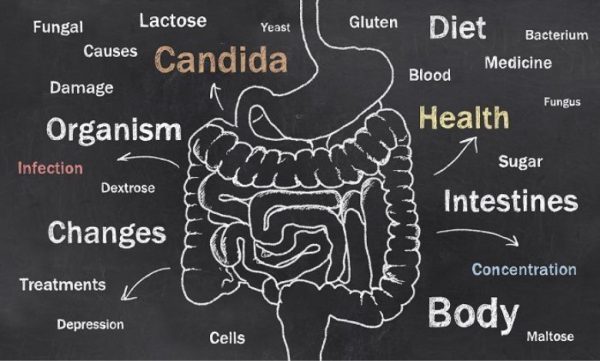

The opportunistic yeast Candida Albicans can affect anybody and it comes in a variety of different forms that can be caused by several things.
You may not have heard of it before, but it’s something that a lot of people are suffering with and don’t even realize it. Most commonly, it grows in your gut.
A lot of the symptoms tend to be things that are also caused by certain lifestyle choices and by other, more benign illnesses and most people wouldn’t assume they have some kind of fungus.
But Candida grows very easily and there is a lot of ways that you can inadvertently cause an overgrowth of it in your system.
The first step to solving this problem is recognizing the symptoms. Here are three things that Candida sufferers tend to report as symptoms of their condition:
As we said, the most common place that you are likely to have an overgrowth of Candida is in your intestines, and there’s a lot of intestinal problems it can cause.
If left untreated it can lead to more serious things like IBS and Crohn’s disease or even colorectal cancer in some cases.
But because Candida Albicans is essentially an abundance of bad bacteria, it will throw off your bacterial balance.
Your guts need good bacteria to function properly, so when you’ve got Candida you can expect things like constipation and diarrhea.
You’re also likely to feel a lot of intestinal discomforts. Now, these symptoms are common with other problems too, so don’t assume Candida unless you also experience other symptoms.
I don’t mean just feeling a little bit tired in the mornings or evenings here, fatigue is a symptom of Candida when it’s chronic fatigue syndrome.
This is when you constantly feel tired no matter how many hours of sleep you get or how much you take it easy during the day.
We all have bad days or even bad weeks when it comes to being tired, but it’s happening over a period of several months, it’s probably time to start looking into it.
Chronic fatigue syndrome is actually categorized by a minimum of six months of constant fatigue.
You’ll probably also experience some other side effects of it such as headaches as well as brain fog.
Chronic fatigue syndrome rarely happens for no reason, so if you have this alongside some digestive issues there’s a good chance that it’s being caused by Candida.
This is what happens when the Candida fungus finds its way into your bloodstream and starts to spread through your muscles and your bones.

As a further illustration of just how serious Candida can get, it can actually cause you arthritis if you leave it untreated for too long.
You’re most likely to be affected in your hips and knees and your joints can get swollen, stiff or can just generally be tender and sore.
Eventually, it can result in some bone infections such as osteomyelitis and the trouble with this is that it can actually be pretty tricky to get rid off.
Even if you get your Candida under control, sometimes you need to seek further therapy to actually get rid of bone infections.
So it’s best to try and tackle your Candida before you find yourself with a much less manageable problem like this one.
If you want to learn a bit more about the symptoms of Candida, check out this great resource from The Candida Diet.
So if it is Candida that you’re dealing with, what can you do about it? Well here’s a couple of things that should help you:
This is definitely the first thing that you should do because chances are, it’s your diet that has been causing this problem in the first place.
To get rid of the Candida that’s already in your system, you need to starve it. You have to eliminate the foods you’re eating that feed the fungus.
So what are these foods? Well, there’s sugar first of all. You probably shouldn’t be eating much of this anyway and Candida is one of the reasons why.
This also means that you should remove a lot of fruit from your diet too, a lot of them tend to be high in sugar.
You can reintroduce fruit into your diet once the Candida goes away but chances are Candida won’t go away while you still have a high sugar diet.
Starchy vegetables are also a big part of the problem. Potatoes, yams, and beats have all got to go and you shouldn’t drink much alcohol either.
Replace these things with clean meats, as well as healthy fats like coconut and avocado and fermented foods such as kimchi and sauerkraut.
The connection between your gut and your brain cannot be understated. You’ve heard of the term gut feeling right?
Well, that’s a real thing that has real scientific support. A lot of the good and bad bacteria in your body forms in your gut, and it’s the same bacteria that powers your brain.
If your gut is under strain, then your body will focus less on its energy on your brain, which means that you won’t be thinking clearly.
It’s the reason why Candida can cause brain fog and it’s also why intestinal issues can result in depression and anxiety.
It works both ways too though, if you’re stressed out, then your body will focus on your brain and not other areas such as your gut.
So in addition to focusing on your diet, try and work on anything in the life that’s causing you stress.
Not everybody takes daily supplements, and that’s not necessarily a bad thing, but if you do you need to be careful about which ones.

The problem with a lot of supplements is that they often have hidden sugars in them. This is actually a problem with a lot of food you’d buy in the store too.
You’ll find that there are ingredients listed which you don’t recognize and a lot of these are actually just sugar with misleading names.
This is common in a lot of vitamin supplements. They’ll have added glucose but it will be listed as something else like ‘dextrose’.
As I said, sugar is a really bad thing to be eating if you’ve got Candida and it can sneak its way into your diet through these supplements.
What you should do is research and find out about all of these different names that sugar hides under and be on the lookout for them.
There’s also plenty of good supplements out there which can help you eliminate Candida and keep it at bay once you’ve gotten rid of it.
I think a good word to describe Candida Albicans would be ‘stealthy’. It can sneak its way into your system without you realizing it.
And because of its nondescript symptoms, it can be hard to nail down that it’s actually Candida which is causing your problems.
So if you think you’re suffering from Candida, keep an eye out for these symptoms and maybe also consult with a doctor.
It shouldn’t be too hard to get it under control if you work hard on your diet and your lifestyle.